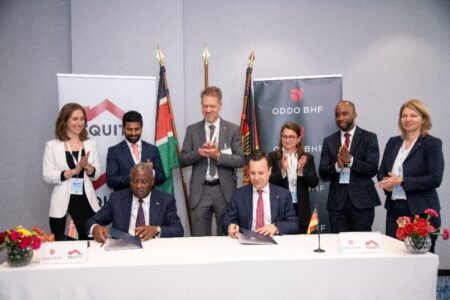Women mean business in Africa, and available data shows that they tend to execute business operations or manage, compared to their male counterparts, thus—supporting women business with credit, business skills, and conducive operating environment might be the break that Africa has been eyeing.
According to the World Bank Report (Profit from Parity, Unlocking the potential of women business in Africa-2019), there are three factors that are found to limit women potentials in the business sphere, which are social norms, legal discrimination and the risk of gender-based violence ( for instance, the report shows, 14 per cent of women entrepreneurs in Malawi have been subjected to physical or emotional violence from their male counterparts).
All three factors are also buried under various segments such as endowment, which carry: education/skills, confidence or risks, finance and assets, networks and information. Another segment, that is an underlying constraint is the household level environment, which affects the allocation of production resources, and time constraints.
The report data came out rather significant factors to dissect particularly on how can women business initiative be enhanced and sustained over time and space. The report data indicate that African women are likely to be engaged in a workforce more than other groups across the developing world landscape.
Half of the African women are active forces in the agriculture sector, while 38 per cent work in identified non-agriculture sectors.
Per the report, Women’s strong non-agricultural labor-force participation rate is driven in large part by their participation in entrepreneurship. About 50% of the women who are in the labor force but not working in agriculture are entrepreneurs. Africa is the only region where women are more likely to be self-employed than men. In non-agricultural sectors, 58% of the self-employed are women, and 45% of employers are women, the highest rate alongside Europe and Central Asia.
READ:Boost for Kenyan women SMEs as they improve standards
Women business scenarios in Africa
It is important to understand the female business profile in Africa, as the World Bank’s report data places them within the length of–the typical female entrepreneur of 37 years old, married or living with a partner, with low levels of education. About 71% of female entrepreneurs have completed primary school, 30% have finished secondary school, and only 9% have completed higher education.
Business for them is a full-time job, with two workers, working for an average of 22 days per month and mostly operating within the retail sector with low capital investment. But also—exhibit variation in accessing financial services in their affairs as half of the female entrepreneurs will have financial accounts than male counterparts.
For decades women have been the backbone of the African economy, and according to the African Development Bank (AfDB), Africa has a substantial number of entrepreneurs in the world.
The Global Entrepreneurship Monitor (GEM) 2016/2017 women’s report, shows that—the female entrepreneurship rate in sub-Saharan Africa is 25.9 per cent of the female adult population, which is means that, one in four women, starts or manages a business.
It has also been found that it is typical for women to reinvent 90 per cent of their incomes in education, health, and nutrition of their family and community, compared to 40 per cent of their male counterparts, taking a close look on women and investing strategically in their business endeavors can transform societies.
According to AfDB women face challenges getting loans, as lending women is perceived as a risk because they lack traditional collateral and guarantees.
There is a capacity gap within financial institutions in Africa. It is the lack of capacity to understand and respond effectively to women entrepreneurs— who are in the same fashion—incapable to comprehend financial complexities existing in the respective financial institutions.
Additionally, business environments in many African nations mars women chances to excel, as legal and regulatory frameworks are ineffective.
Further, it has been found out that women face various hurdles in accessing finance, it is estimated that there is a $42 billion financing gap for African women across business value chains, including $15.6 billion in agriculture.
Affirmative Finance Action for Africa
Affirmative Finance Action for Africa (AFAWA) is a rather robust pillar that can revitalize the women’s financial landscape in Africa substantially.
According to AfDB, the AFAWA finance challenges the present gender gap in accessing finance and liberates women’s entrepreneurial capacity in Africa.
It has two solutions for women in African, which will cut across and transform the banking and financial landscape in Africa and create incentives for lending to women in business, including A $300 million risk-sharing instrument to unlock $3 billion in credit for women businesses and enterprises in Africa.
This mechanism will build upon the existing network of commercial banks and microfinance institutions to create structural change and lasting impact for women. A rating system to evaluate financial institutions based on the share and quality of their lending to women and their socio-economic impact. Top institutions will be rewarded with preferential financing terms from the African Development Bank.
On the same mark, the AFAWA landscape will be immensely levitated by, AFAWA technical assistance which provides advisory services to financial institutions to ensure successful implementation of their product portfolios for women, and strengthens the capacity of women entrepreneurs through training to enhance business productivity and growth.
Further, AFAWA enabling environment engages with African governments and other key stakeholders to support legal, policy and regulatory reforms and strike down the structural barriers impeding women in business.
In 2018 AfDB placed over $ 50 million in credit to women through financial institutions such as Fidelity Bank and Kenya Commercial Bank. Further, the bank made another investment of $ 12.5 million in Alitheia IDF Managers, which is the first female-managed private equity fund, investing in high-growth women-owned and led Small-to-Medium Enterprise (SME’s) in Africa.
On technical assistance, in 2018 AFAWA offered technical assistance to several banks and partnered with Entreprenarium Foundation to train 1,000 women entrepreneurs in Africa, on business model development and financial planning.
READ: Promoting women will boost African economic growth, World Bank says










